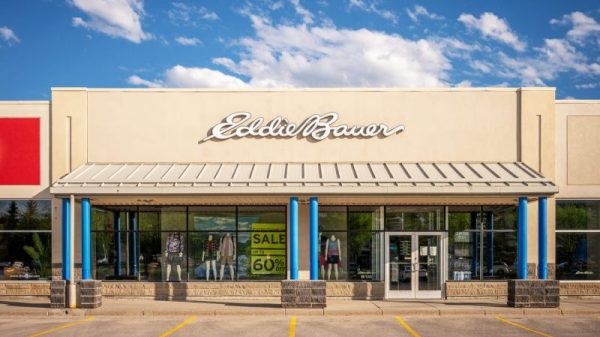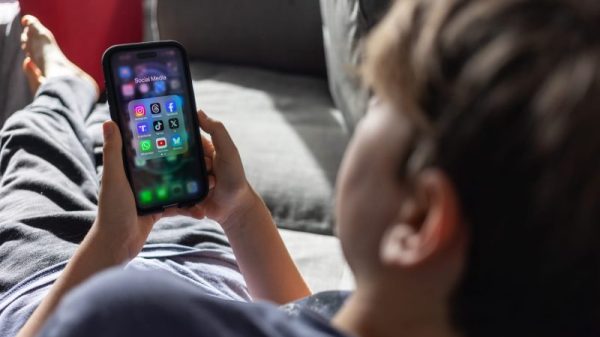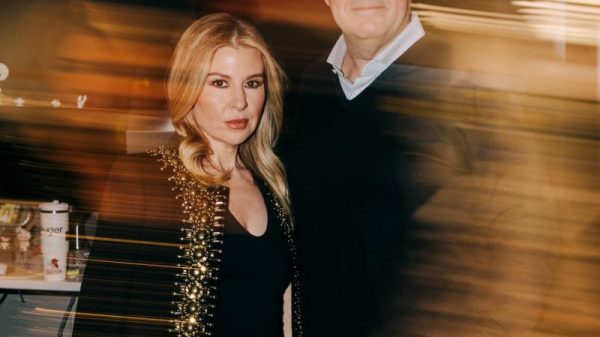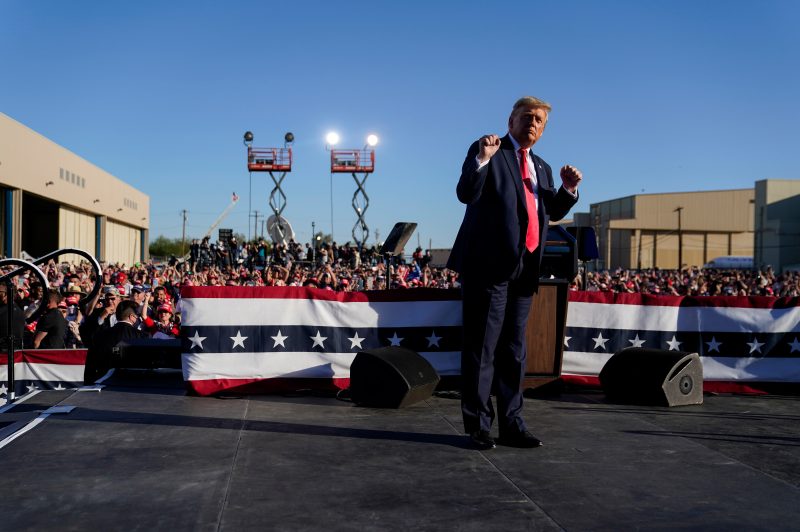PHOENIX — An Arizona grand jury on Wednesday indicted seven attorneys and aides affiliated with Donald Trump’s 2020 presidential campaign as well as 11 Arizona Republicans on felony charges related to their alleged efforts to subvert Joe Biden’s 2020 victory in the state, according to an announcement by the state attorney general.
Those indicted include former Trump White House chief of staff Mark Meadows, attorneys Rudy Giuliani, Jenna Ellis, John Eastman and Christina Bobb, top campaign adviser Boris Epshteyn and former campaign aide Mike Roman. They are accused of allegedly aiding an unsuccessful strategy to award the state’s electoral votes to Trump instead of Biden after the 2020 election. Also charged are the Republicans who signed paperwork on Dec. 14, 2020, that falsely purported Trump was the rightful winner, including former state party chair Kelli Ward, state Sens. Jake Hoffman and Anthony Kern, and Tyler Bowyer, a GOP national committeeman and chief operating officer of Turning Point Action, the campaign arm of the pro-Trump conservative group Turning Point USA.
Trump was not charged, but he is described in the indictment as an unindicted co-conspirator.
The indictments cap a year-long investigation by Arizona Attorney General Kris Mayes (D) into how the elector strategy played out in Arizona, which Biden won by 10,457 votes. Arizona is the fourth state after Michigan, Georgia and Nevada to seek charges against those who formed an alternate slate of presidential electors. As those cases slowly make their way through the legal system, Trump is again running for president, and officials in Arizona and other battleground states are preparing for another likely contentious election.
In releasing the indictment, Mayes’s office redacted the names of all of the individuals outside of Arizona who were charged until they have been served their indictments. The Washington Post was able to identify all of them through the accounts of their alleged actions described in the indictment.
George Terwilliger, a lawyer representing Meadows, said he had not yet seen the indictment.
‘If Mr. Meadows is named in this indictment, it is a blatantly political and politicized accusation and will be contested and defeated,” he said.
Epshteyn declined to comment. Hoffman, Bowyer, a spokesman for Giuliani and attorneys for Roman, Eastman and most of the Arizona Republicans did not immediately respond to requests for comment.
Many of those involved in the 2020 elector strategy, which played out in Arizona and six other states, have long insisted that the tactic was legal because the Trump electors were only placeholders to be activated if legal challenges to Biden’s win were successful in court. But Mayes charges that Trump’s allies inside and outside of Arizona intended all along to use the electors to falsely claim that the outcome of the election was in doubt — facilitating an effort to obstruct the certification of Biden’s victory in Congress on Jan. 6, 2021.
Unlike probes by state prosecutors in Michigan and Nevada, Mayes took a top-to-bottom approach with her investigation. Similar to prosecutors in the Atlanta area, Mayes targeted not just local conservatives who carried out the plan in Phoenix, but also the out-of-state middlemen in Trump’s orbit who allegedly helped put it together. But unlike in Georgia, Mayes did not try to indict the former president.
This is a second round of charges for Meadows, Giuliani, Ellis, Eastman and Roman, who were all indicted alongside Trump in Georgia last year. Ellis pleaded guilty in October to illegally conspiring to overturn Trump’s 2020 election loss in Georgia and has been cooperating with prosecutors. This is the first time Epshteyn — now a top 2024 campaign aide who frequently talks with the former president — has been charged for his alleged actions after the 2020 election.
Mayes’s case had been squarely focused on local conservatives up until late last year. Then, Arizona prosecutors and investigators met in December with Kenneth Chesebro, an attorney and an architect of the elector strategy who pleaded guilty in Georgia in October to a single felony count of participating in a conspiracy to file false documents. Chesebro provided Mayes’s team with records — some that had been previously unseen — that revealed more information about those involved in the Arizona effort, according to two people familiar with the investigation who requested anonymity to talk about the sensitive conversations. After that, they said the Arizona investigation widened.
Much of the activity that Mayes investigated happened in the weeks after Biden was declared the winner in Arizona and Dec. 14, 2020, when the Republican electors gathered to sign paperwork. Emails, records, text messages and other documents from this time have emerged in a variety of ways, including from the U.S. House select committee that investigated the Jan. 6, 2021, attack on the U.S. Capitol.
After the election, Giuliani and Ellis frequently traveled together as they worked to overturn Trump’s loss, state by state. Both attended a Nov. 30, 2020, event in downtown Phoenix attended by state GOP state and federal lawmakers, where they falsely claimed widespread fraud had marred the election. Then, Giuliani, Ellis and other Trump allies tried to convince then-Arizona House Speaker Russell “Rusty” Bowers (R) to help overturn the results.
Bowers, speaking in 2022 before the House committee, said he remembered Giuliani saying during that meeting, “We’ve got lots of theories — we just don’t have the evidence.”
Bobb, who has ties to Arizona, communicated with Trump allies about the strategy. After the House speaker met with Giuliani and other Trump allies, Bobb emailed the then-state senate president with information that Giuliani believed could be used to sow doubt in the 2020 outcome.
Eastman, a pro-Trump lawyer who helped devise the multi-state strategy, outlined how it could be achieved.
Roman, the campaign staffer who oversaw election-day operations, circulated emails about the alternate elector plan, tracked elector participation in several states and communicated about making sure the paperwork was in Washington by Jan. 6, 2021, when Congress convened to count electoral college votes. Roman directed Chesebro to make sure that Ward, the state party chair, had the necessary paperwork to prepare for the signing of official-looking paperwork, according to emails that have been made public.
In early December 2020, Epshteyn emailed a Wisconsin-based attorney who was aiding the campaign and asked him to draft sample language for alternate electors in seven states, including Arizona. Epshteyn wrote that the request came from Giuliani, and he added, “If that’s difficult, we can have counsels in those states do it.”
Meadows, as Trump’s final White House chief of staff, has sought to downplay his involvement in the elector plan. In a federal court hearing last August in Georgia, Meadows repeatedly testified under oath that he played no role in the elector effort. Prosecutors introduced into evidence December 2020 emails between Meadows and Jason Miller, a longtime Trump campaign aide that showed Meadows forwarding a memo about the plan to Miller.
“Let’s have a discussion about this tomorrow,” Meadows wrote. When Miller told him the campaign was already talking about it, Meadows replied, “We just need to have someone coordinating the electors for the states.” In court, Meadows sought to downplay the email, saying that his use of the term “we” meant the campaign, not him. Meadows also testified that he did not want to get “yelled at” by Trump.
On Dec. 12, 2020, Republicans in Arizona were finalizing plans to assemble in Phoenix to stand in solidarity with Trump. Ward emailed Chesebro, Roman and others that the Trump campaign had requested the participation of Arizona electors. “We are all prepared to meet 12/14,” she wrote. “It would be optimal if the campaign created and produced the documents in the ACTUAL format needed so staff can print the collateral, the electors can show up, meet/vote, and sign, and then staff can collate the documents and send to the appropriate places in the appropriate way.”
Roman responded to the group and directed Chesebro, “Please send the full updated AZ packet.”
Ward also made clear in her email that she had talked to Giuliani. She wrote that she had “told him we were working to make sure we accomplish what we need to do.”
On Dec. 14, 2020, the day the electoral college formally convened, Ward and other pro-Trump Republicans gathered at the state party’s headquarters. The party publicized the event — which they called “The Signing” — on Twitter, and electors posed for photos.
In the weeks following the Jan. 6 attack, prosecutors across the country weighed whether to investigate pro-Trump electors in their states. At the time in Arizona, then-Attorney General Mark Brnovich (R) chose not to do so. After Mayes won her election in 2022 — partly on a promise to investigate the elector strategy — she assigned a team of prosecutors to begin pursuing evidence.
Along the way, state prosecutors spent several hours interviewing Bowers, Republican members of the Maricopa County Board of Supervisors who voted to approve election results from the Phoenix area and others familiar with how the elector maneuver unfolded inside of the state GOP.
In early March, the probe began nearing an end, and the pro-Trump electors received subpoenas requesting their testimony before a grand jury. Many had been advised to invoke their Fifth Amendment right not to answer questions.
Holly Bailey in Atlanta, Amy Gardner in Portland, Ore., and Josh Dawsey and Maegan Vazquez in Washington contributed to this report.



























